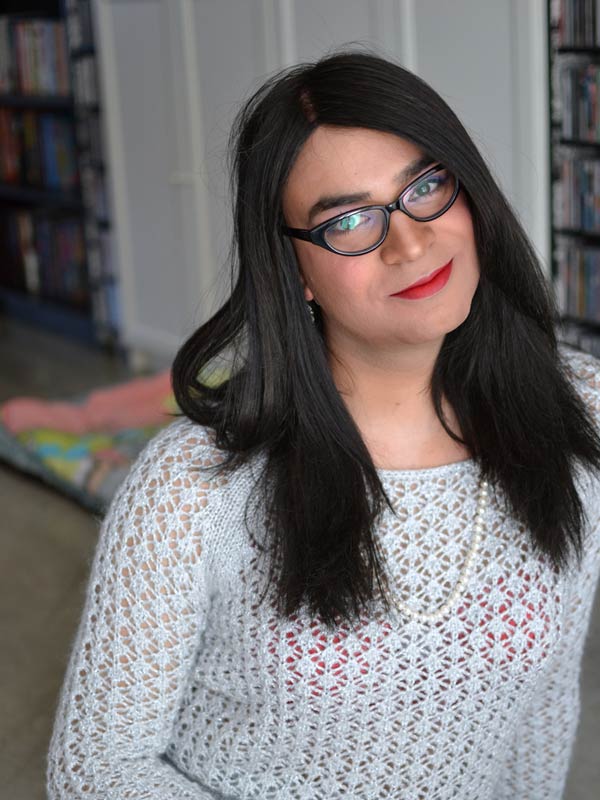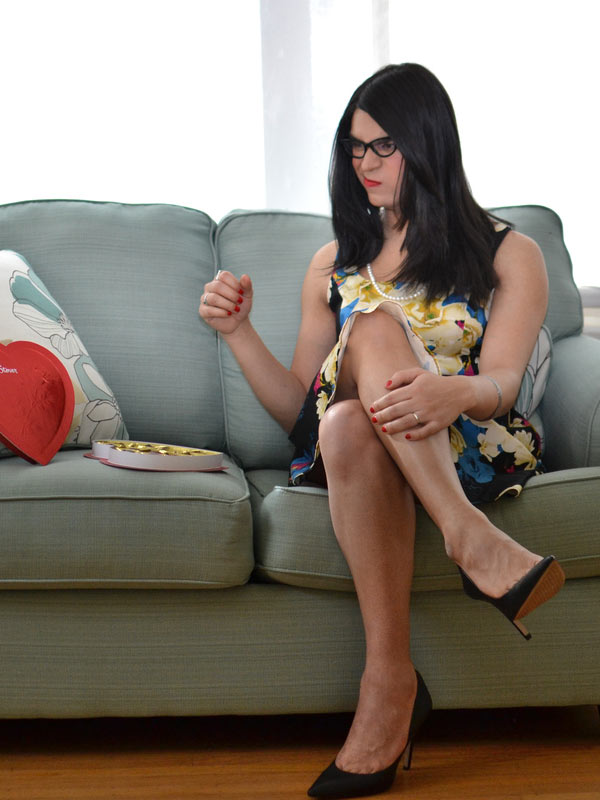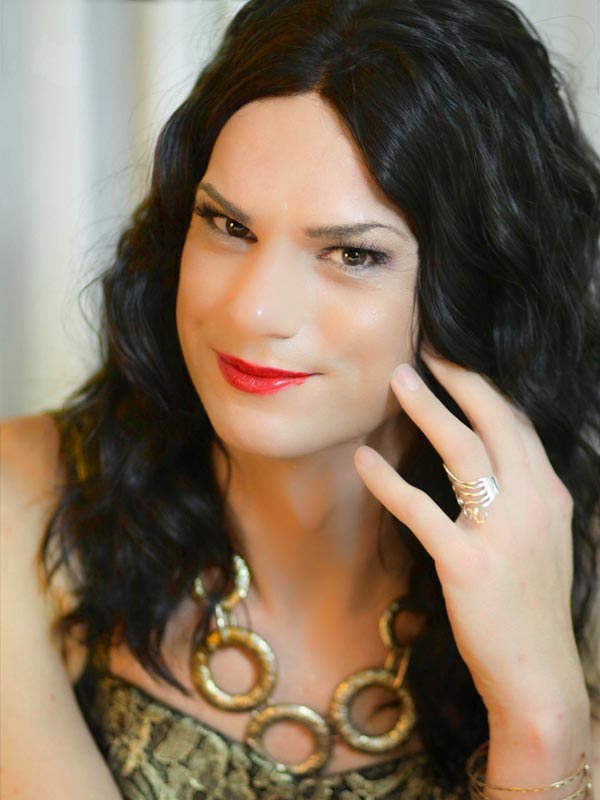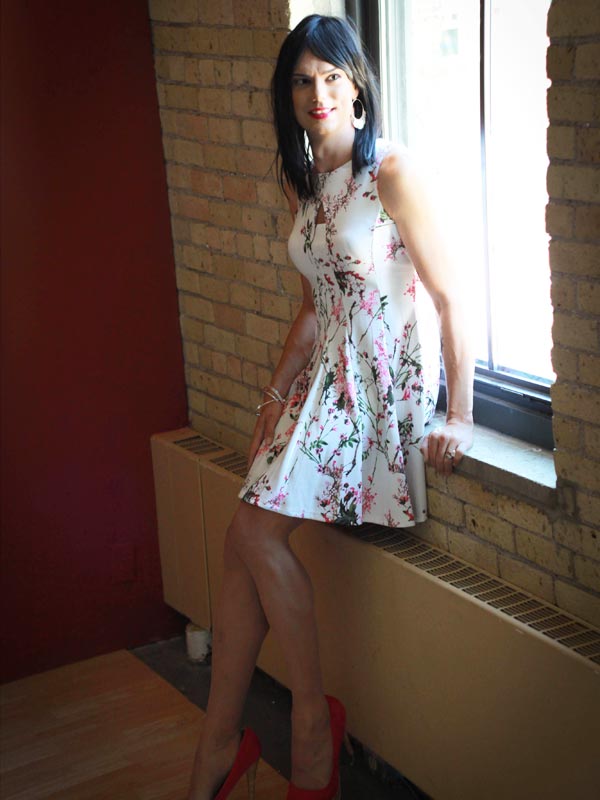Liz Summers
Liz talked to us via video chat to tell us about her life, crossdressing and hopes for the future. Check out her amazing blog.

Hi Liz! Thanks for talking to us today and answering our questions. When did you realise you were a crossdresser? Was there a long road to acceptance?
I guess so. I mean like when I was like a kid, I guess like I associated a little bit more with girls, and I got a little bit more feminine. But when I was like around 16, I guess like I discovered Eddie Izzard and he kind of like put a name to what it was. It was like, "All right, it's not like I'm like this terrible monster that everyone might be scared of. It's just like a thing that people do."
Yeah, in terms of coming to terms with it, that was like, I guess, the hardest thing, because even when you see someone who's doing it and is out there, you have this fear that everyone's going to treat you like a monster, or they have all these like preconceived ideas about what it's about, which aren't necessarily true.
It was like, "All right, it's not like I'm like this terrible monster that everyone might be scared of. It's just like a thing that people do."
So from, I guess, when I was 16 to when I was maybe like 20, let's say 20, maybe like 22, I guess. It takes a long time to realise that it's just a thing and it's not going to change anytime soon. So I guess maybe like five years, from when I figured out what it was to like actually dealing with the fact that it's not going away, and I'm not hurting anyone.
Was there a period of secrecy, where you were living a "double life"?
Not really, to be honest. I think when I started, when I understood a little bit more about what it was about, I was very honest with, I guess, my very close friends. But there were people who I didn't tell, like I didn't tell my family. I didn't tell my parents or my brother or anything while I was still trying to get better at things, which takes a little while.
But not particularly. I mean, I think I had a lot of friends, like in person, who knew. I had a lot of friends online who knew. I think I was always like very open about it. When I did start to tell people, even more of them, like I started to tell, I guess, more friends or acquaintances and then co-workers and then, finally, family, there was never a point where anything bad happened.
Everyone was either very supportive or the majority of reactions which is, no one actually cared, at all, which was definitely, like, fairly comforting. Yeah, everyone was either supportive or they didn't care.
Did any of your relationships suffer when you came out?
No, actually, which I think was the most surprising thing. I can't think of anyone who like faded away into the background or dropped out or said anything negative. I think I've been incredibly lucky inasmuch as, yeah, everything's, so far, gone really well. Yeah.
Did you have any fears about telling people?
Yeah, it was terrifying. I think, for me, I came out in like little bits and pieces. Obviously, my closest friends knew. But there was this one time at work, we had like a... It was like a fancy-dress party. The theme was circus freak. I said, "All right. I have the perfect outfit. I can come as like a bearded lady or whatever." It went really well, but there were all these like hints of, "Oh, is there something he's not telling us?" And there was, because I wasn't telling anyone anything.
But then like a few months later we had like another fancy-dress party again, so I did it again. It became, I guess, like a thing, like people were expecting me to dress up like a woman again.
And then one day, like at work, because I was dressed up, I was taking pictures and there was one picture that I really liked. So I wanted to show people. It was like, "Why can't I show people some photos?"
Is anyone going to talk to me ever again? Are the people who don't know, are they going to hate me? What are they going to think about me?
My first inclination was like, "Maybe I shouldn't. Maybe I'll just put some up on Facebook," which is how I ended up coming out. It was like the fear of like: is anyone going to talk to me ever again? Are the people who don't know, are they going to hate me? What are they going to think about me? Are they going to think things are like incorrect? Are they going to think I'm some kind of monster or like some sexual deviant?
And you go around with all these fears all the time, and it's a little bit scary. It's terrifying, but I think one thing that you never realise is that all of these fears are basically, again to some extent, unfounded.
Is there a sense of shame felt by crossdressers before they come out? Do you have any advice for dealing with it?
Yeah. I mean the shame thing is hard, because I think as you grow up, I mean, when I grew up, at least, things are seemingly a lot better now for younger people. But when I was growing up, it seemed like wearing clothes of a different gender, or dressing up to be like a woman was like a joke. Or, I mean, you'd see something like "Silence of the Lambs", where Jame Gumb is like, you know, this I guess like crossdressing, transy, sexually deviant. Although, like, Hannibal Lecter does make a comment about being like a common crossdresser or whatever.
It was definitely... you see these things in like horror movies. They use it as something that's seen as "other". Right? So when you know that you are a crossdresser and you see people seeing you as this thing that's not like everything else, it's other - not necessarily human, like humane - you just start to internalise it and you start to feel like, "Oh, I'm different. I'm a monster. I am a terrible person."
In terms of coming to terms with it, which is I think the hardest thing out of everything, you just kind of have to realise you're not hurting anyone. This is who you are, and it's not going to change, as much as people have tried to like get away from it and stop doing it. Yeah, the hardest part has always been just realising you're not doing anything wrong. Once that's done, everything's great after that. Yeah.
Crossdressing can be hard to talk about. How should someone approach the conversation?
I guess it's basically just be honest about what you don't know. Be open-minded because I think if it's come into the conversation with all these preconceived ideas about what it involves, which I think for the most part, at least for me - can't speak for everyone - are wrong. Yeah, I think be honest, be open-minded, and try and be understanding about the difficulties involved in being who we are and doing what we do.
Do you have any advice for someone out there struggling right now?
the thing that I struggled most with was asking myself, "Why am I like this? Why do I feel I have to do this?" and realising that it's just how I was made or how I was built.
It's very cliché, but it does get better like over time. But like I said, the thing that I struggled most with was asking myself, "Why am I like this? Why do I feel I have to do this?" and realising that it's just how I was made or how I was built. That helped a lot.
Just to accept the fact, once you accept who you are, once you've accepted this is a part of your life that isn't going away, and accept that you're not doing anything wrong or hurtful or immoral, I think you start to feel happier almost immediately. It's very liberating, realising that you can just live your life without this shame or stigma that you've been harbouring for years.

Did you have a support network of other crossdressers, either online or out in the "real world"?
Mostly online. I mean, even to this day. I think I spent a while, when I was younger, trying to find these different communities, online, of crossdressers, and it was actually very hard to find a group that I found that I associated well with, because I think back then there were a lot of like older crossdressers online who had a different idea of what it was about. There was this whole thing of pretending that they were women. I don't know, it didn't seem real. They had these fake personas which didn't seem very real to me.
I think it was, I guess, two years ago now, when I found out the crossdressing subreddit on Reddit, which is hugely supportive. Everyone feels like they're real people, like you can have conversations. As well as that there's an associated IRC channel which a lot of people talk in, which has been hugely helpful. It's been a really great community.
In terms of in real life, there's definitely a few people who I know in real life, like we hang out with every so often. But mostly, because of being busy or being lazy, we don't actually meet up that often.
Recently, there's been a revolution in equality but a lot of prejudice remains. Do you think this will change?
I'm definitely hopeful. The fact that trans issues have been at the forefront of so many things. You see shows like "Transparent". It is like being injected more and more into the public eye. With that, as younger people who are growing up in a world where it's much more acceptable, as they continue to grow up and the more society becomes more accepting of trans and crossdressing, I think things are only going to get better and better for the community.
Do you have any tips for looking AMAZING?
Make-up is terrifying.
Yeah, two. One is practice. Make-up is terrifying. Even getting ready today, I put everything out on a table and there were like 25 different things. There were like seven brushes and two different types of everything. It can seem so terrifying to begin with, but once you accept yourself and it's not going away, you kind of open yourself up to the fact that to get good at this requires practice.
So putting the time in. Looking up guides online and tutorials and looking at videos to find out what you're doing wrong and really paying attention to the kind of make-up that women wear or like the kind of clothes that women wear.
I think a lot of people tend to go for - initially I did as well - like really short skirts and absurdly high heels and ridiculous make-up. Giant boobs and just everything that's like too far off the end. Try and rein it in and actually observe what women wear.
The second tip: smile. It's interesting; even now when I take photos, I tell myself the difference that just smiling will make to a good-looking photo. Don't be afraid to be happy.
Thanks Liz. Anything you'd like to add?
Focus on finding out who you are and being yourself.


